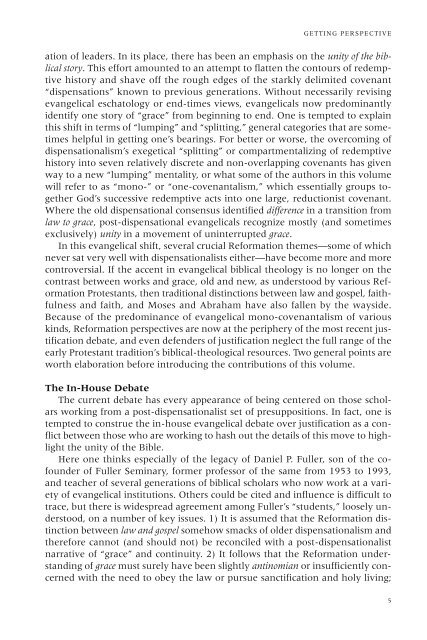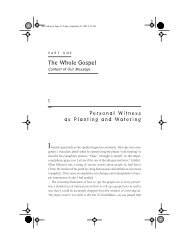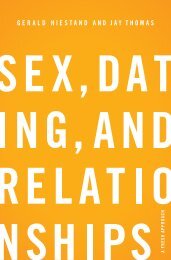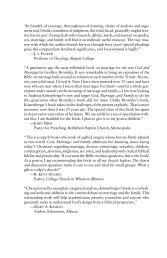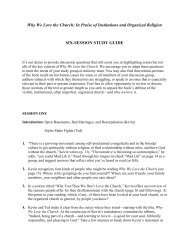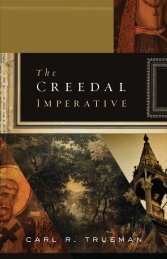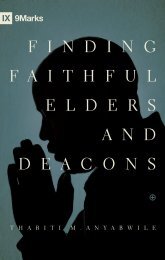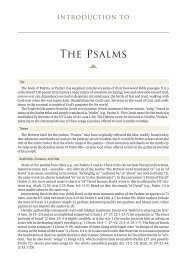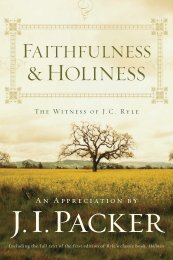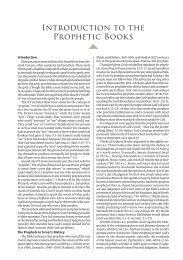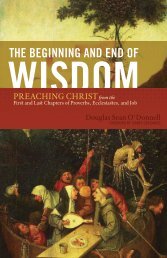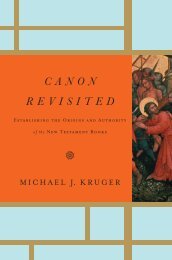JUSTIFIED - Monergism Books
JUSTIFIED - Monergism Books
JUSTIFIED - Monergism Books
- No tags were found...
Create successful ePaper yourself
Turn your PDF publications into a flip-book with our unique Google optimized e-Paper software.
GETTING PERSPECTIVE<br />
ation of leaders. In its place, there has been an emphasis on the unity of the biblical<br />
story. This effort amounted to an attempt to flatten the contours of redemptive<br />
history and shave off the rough edges of the starkly delimited covenant<br />
“dispensations” known to previous generations. Without necessarily revising<br />
evangelical eschatology or end-times views, evangelicals now predominantly<br />
identify one story of “grace” from beginning to end. One is tempted to explain<br />
this shift in terms of “lumping” and “splitting,” general categories that are sometimes<br />
helpful in getting one’s bearings. For better or worse, the overcoming of<br />
dispensationalism’s exegetical “splitting” or compartmentalizing of redemptive<br />
history into seven relatively discrete and non-overlapping covenants has given<br />
way to a new “lumping” mentality, or what some of the authors in this volume<br />
will refer to as “mono-” or “one-covenantalism,” which essentially groups together<br />
God’s successive redemptive acts into one large, reductionist covenant.<br />
Where the old dispensational consensus identified difference in a transition from<br />
law to grace, post-dispensational evangelicals recognize mostly (and sometimes<br />
exclusively) unity in a movement of uninterrupted grace.<br />
In this evangelical shift, several crucial Reformation themes—some of which<br />
never sat very well with dispensationalists either—have become more and more<br />
controversial. If the accent in evangelical biblical theology is no longer on the<br />
contrast between works and grace, old and new, as understood by various Reformation<br />
Protestants, then traditional distinctions between law and gospel, faithfulness<br />
and faith, and Moses and Abraham have also fallen by the wayside.<br />
Because of the predominance of evangelical mono-covenantalism of various<br />
kinds, Reformation perspectives are now at the periphery of the most recent justification<br />
debate, and even defenders of justification neglect the full range of the<br />
early Protestant tradition’s biblical-theological resources. Two general points are<br />
worth elaboration before introducing the contributions of this volume.<br />
The In-House Debate<br />
The current debate has every appearance of being centered on those scholars<br />
working from a post-dispensationalist set of presuppositions. In fact, one is<br />
tempted to construe the in-house evangelical debate over justification as a conflict<br />
between those who are working to hash out the details of this move to highlight<br />
the unity of the Bible.<br />
Here one thinks especially of the legacy of Daniel P. Fuller, son of the cofounder<br />
of Fuller Seminary, former professor of the same from 1953 to 1993,<br />
and teacher of several generations of biblical scholars who now work at a variety<br />
of evangelical institutions. Others could be cited and influence is difficult to<br />
trace, but there is widespread agreement among Fuller’s “students,” loosely understood,<br />
on a number of key issues. 1) It is assumed that the Reformation distinction<br />
between law and gospel somehow smacks of older dispensationalism and<br />
therefore cannot (and should not) be reconciled with a post-dispensationalist<br />
narrative of “grace” and continuity. 2) It follows that the Reformation understanding<br />
of grace must surely have been slightly antinomian or insufficiently concerned<br />
with the need to obey the law or pursue sanctification and holy living;<br />
5


